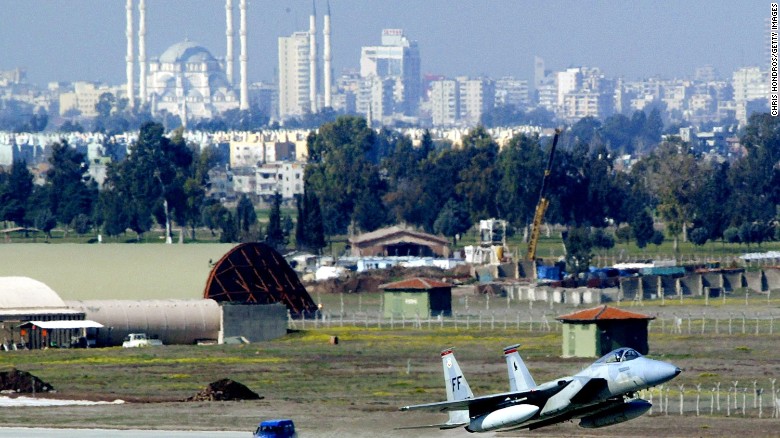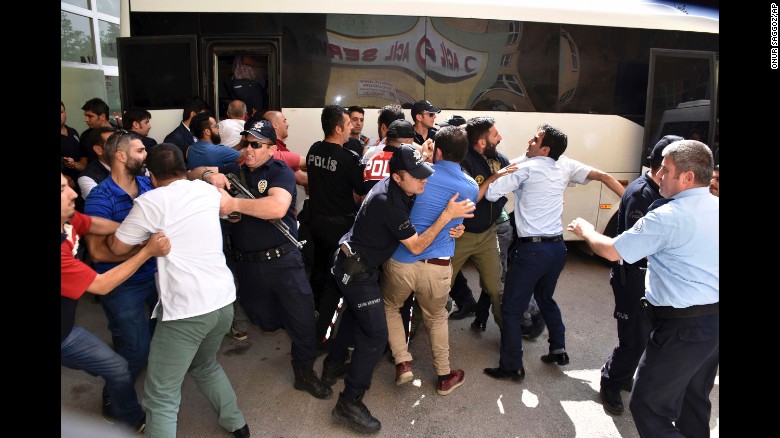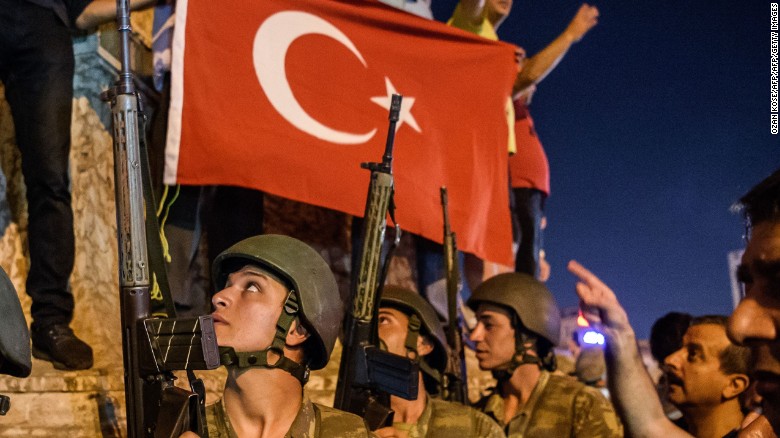More than 9,000 military officers are in detention already and the number keeps climbing.
The question is, when does this NATO ally hollow out its armed forces to the point of failure?
The simple answer: No time soon. But that belies the details of precisely who has been arrested.
Turkey has a conscript army and is estimated to have over 500,000 people in its armed forces. The current detentions you might assume barely scratch the surface of a force with such a deep bench strength.
But the reality is, among those thousands detained are over 100 top generals and admirals — that’s one third of the military’s command, which has NATO allies worried. Many of their long-time military partners are gone, raising concerns around who they deal with and whom can they trust.
The future and stability of key air base

At the Turkey’s Incirlik air base — which is shared with several thousand United States forces the worries run deeper. The Turkish commander, Bekir Ercan Van, and many of his officers at the base were arrested days after the failed coup.
Not only does the U.S. use Incirlik for air operations targeting ISIS just over the border in neighboring Syria, but it stores scores of nuclear weapons in bunkers there. Miscommunication and misunderstanding in this environment would be deeply troubling, not to mention the lives of U.S. and NATO lives, which could potentially be put in danger.
Incirlik is a base for drones and fast jets that not only strike ISIS but provide watch and on-call fire power for U.S. special forces assisting moderate rebels on the ground inside Syria. Deny the protection of such air cover, and the risk of causalities rises rapidly — meaning Turkey quickly appears to be an unreliable partner.
In the hours after the coup began, Turkey halted U.S. anti-ISIS air operations by closing the airspace around the base and although that was lifted soon after Incirlik’s Turkish commander was arrested, power supplies to the base remained cut as the coup was severed.
Rumors in Turkish media swirled of a U.S. hand in the coup. In Ankara, U.S. Ambassador John Bass, penned a powerful repost, calling rumors “categorically untrue” and “harmful.”
When I asked Deputy Prime Minister Mehmet Simsek about how the decimated military hierarchy would function with their NATO allies he told me: “The coup attempt will give strength to Turkey and NATO.” When pushed about what he meant, he explained: “NATO member states are all democracies like Turkey,” that the coup was an attack on democracy and this should bring us all closer together.
Nevertheless NATO sees generals it trusted in the dock. Gen. Akin Ozturk — a highly decorated Four Star General who commanded a NATO forces in Afghanistan — has been accused of leading the coup plotters. Though he denies the accusation, what is even more worrying for Ozturk’s friends at NATO and his family, are the photos which were taken of him in the hours after his detention in which he appears to have been beaten. Ozturk had bandaged ears, bad rope burns and bruising high on his arms, raising suspicions he had been strung up by his arms bound behind him.
Detained soldiers in harsh conditions
When Ozturk appeared in court the following day, his injuries and those of some of the other officers on trial with him seemed worse. A picture of detained soldiers hinted at the harsh conditions they are being held in, while CNN verified an image of dozens of men with their hands bound behind their backs, naked — apart from their underwear — on their knees amid the sawdust of a horse stable.

The deputy prime minister brushed aside concerns of mistreatment when I asked him about Ozturk’s bruising. He said Ozturk and other officers had been resisting arrest, had put up a fight, “had heavy weapons,” and standoffs lasted several hours. When asked about the soldiers in the stables he said: “this is normal procedures for police under these circumstances”. The soldier’s crimes were “very heavy” he added, so they are “not under a normal investigation.”
None of this will sit easily with NATO allies who expect international obligations to prisoners to be observed. Prisoners held naked, hands bound, breaks international Human Rights conventions and can be considered torture.
Crack in military raises concerns at NATO HQ

In some regards Turkey is a leading member of NATO. Among the alliance, it has the second-largest military behind the U.S., however, it stands alone in that it already causes concerns at NATO headquarters in Brussels.
Only last year the Turkish air force shot down a Russian fighter jet close to the border with Syria. Publicly NATO stood behind its southern most member, but privately some officials expressed surprise at Turkey’s action. Most in the alliance believe in similar circumstances they would have held their nerve and not been so apparently trigger happy.
Russia is in the ascendency, stretching its military muscle all along the Alliance’s eastern border — from Kaliningrad in the north, to Syria in the south. And although Ankara recently patched up relations with Moscow, the very fact its forces lack the steadying influence of a full deck of commanders will worry military planners at NATO HQ.
Turkey sits astride potentially NATO’s biggest fault line with Russia, the Bosphorus, a narrow channel of water and the gate way for Russia’s Black Sea fleet to the Mediterranean and the world’s oceans beyond.
Just two years ago Russia broke international law crossing borders to annex Crimea — home to Black Sea fleet — and has endured heavy international sanctions since. Such is the fleets importance to Russia, it was willing to risk the repercussions. From Crimea, Russian submarines can probe NATO’s coastlines, and its ships keep Russian forces in Syria resupplied.
Nowhere else do Russian ships sail so close to NATO’s shores. The margin for error is minimal. Any miscalculation, or twitchy trigger finger under instruction from a less seasoned commander could plunge NATO and Russia in to an ugly standoff. Bosphorus is the one places NATO needs not to have cracks in any of the Alliance’s military command.
From Washington to Brussels and beyond, capitals are counting on continuity not chaos in Turkey’s changing military line up. Anything less puts the world in a more precarious place.
As reported by CNN
